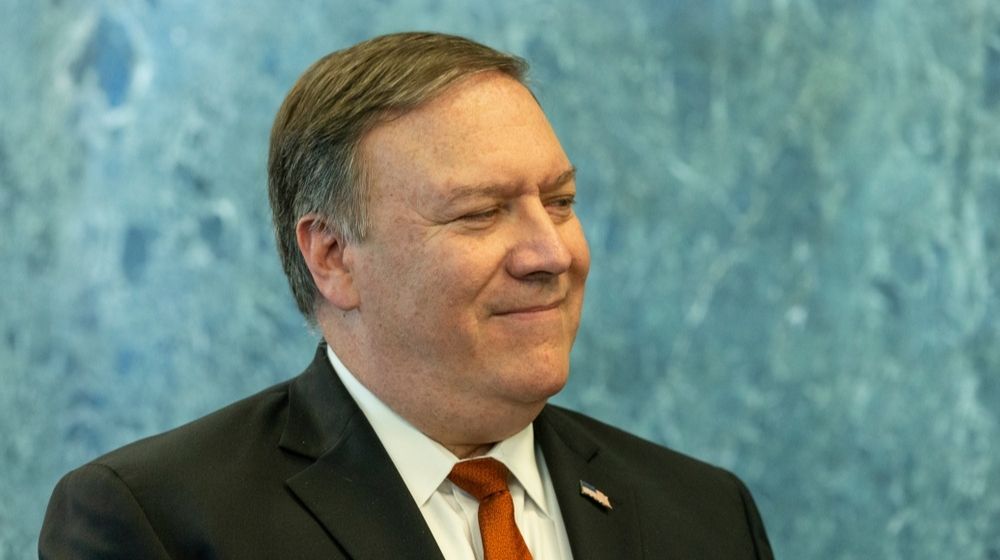Politics
US Top Diplomat Warns of China’s Global Threat

By Nike Ching
PRAGUE – U.S. Secretary of State Mike Pompeo said Wednesday that China's economic power is in some ways a greater global threat than the Soviet Union was during the Cold War.
“The challenge of resisting the CCP (Chinese Communist Party) threat is in some ways more difficult,” Pompeo said in a speech to the senate in the Czech Republic. “The CCP is already enmeshed in our economies, in our politics, in our societies in ways the Soviet Union never was.”
Pompeo's remarks come after China's ambassador to London accused the United States last month of instigating conflict with Beijing before the November U.S. presidential election.
U.S.-China relations have deteriorated sharply this year over issues such as Beijing's management of the coronavirus, its security clampdown in Hong Kong and activities in the disputed South China Sea.
Pompeo held talks with Czech Prime Minister Andrej Babis in Prague earlier Wednesday on the second day of his weeklong visit to central Europe.
The two leaders discussed nuclear energy cooperation and the Three Seas Initiative, a political platform to promote connectivity among nations in central and eastern Europe by supporting infrastructure, energy and digital interconnectivity projects.
The initiative gets its name from the three seas that border the region: the Baltic, Black and Adriatic.
The chief U.S. diplomat began the day taking part in a roundtable discussion with a group of leaders from tech companies from the U.S. and the Czech Republic to highlight the benefits of U.S. investment, and according to the State Department, “underscore the attractiveness of the United States as an investment destination for Czech start-ups.”
The top U.S. diplomat's trip comes as the Trump administration looks to confront Russian and Chinese economic and geopolitical competition in Europe.
In addition to Pilsen, Pompeo is traveling to Prague, Czech Republic; Ljubljana, Slovenia; Vienna, Austria; and Warsaw, Poland, this week.
The trip comes as the Pentagon prepares to move forward with a plan to pull almost 12,000 troops from Germany and redeploy part of the U.S. forces to Poland and other NATO nations, raising concerns at home and in Europe even as senior officials defend it as a strategic necessity.
US Pulling Almost 12,000 Troops From Germany https://t.co/xgF01ZLWiV pic.twitter.com/XvOI6w7NBy
— Voice of America (@VOANews) July 29, 2020
Ambassador Philip Reeker, the State Department's acting assistant secretary for European and Eurasian Affairs, said Pompeo will discuss with his counterparts the just-completed U.S.-Poland Enhanced Defense Cooperation Agreement (EDCA) that “provides a framework” to further strengthen “the broad transatlantic security.”
The defense deal enables the United States for “rotational presence” of an additional 1,000 U.S. troops to “enhance deterrence against Russia, strengthen NATO,” and to assure allies, officials say. About 4,500 U.S. personnel are already on rotation in Poland.
Slovenia
In Ljubljana, Pompeo will sign a Joint Declaration on 5G technology with Slovenian Foreign Minister Anze Logar.
Over the past year, European countries, including Poland, Estonia and the Czech Republic, have signed agreements with the U.S., pledging that 5G suppliers would not be subject to control by a foreign government without independent judicial review, which effectively excludes Chinese firms.
Austria
In Vienna, the U.S.-Austria Strategic Partnership and growing trade relationship will be high on the agenda in Pompeo's meetings with Austrian Chancellor Sebastian Kurz and Foreign Minister Alexander Schallenberg.
Austria hosts the International Atomic Energy Agency, the nuclear watchdog of the United Nations in charge of monitoring Iran's adherence to the 2015 nuclear deal from which the U.S. has withdrawn.
Pompeo will also hold talks with IAEA Director General Rafael Mariano Grossi, as Washington is calling on other members of the U.N. Security Council to indefinitely extend an arms embargo on Iran that is set to expire on Oct. 18.
Poland
In Warsaw, the chief U.S. diplomat will meet with Prime Minister Mateusz Morawiecki and Foreign Minister Jacek Czaputowicz on deepening defense ties, recovering from the COVID-19 pandemic, securing 5G networks, and improving regional energy and infrastructure through the Three Seas Initiative. COVID-19 is the disease caused by the coronavirus.
Pompeo will also meet with Polish President Andrzej Duda, who visited the White House in late June.
Poland sees Nord Stream 2, which would double Russia's gas export capacity via the Baltic Sea, as a threat to Europe's energy security.
Last month, the State Department said people making investments or engaging in activities related to Nord Stream 2, including pipe-laying vessels and engineering service in the deployment of the pipelines, could face U.S. sanctions.
“It's a clear warning to companies: aiding and abetting Russia's malign influence projects will not be tolerated,” said Pompeo during a July 15 press conference.
“Let me be clear. These aren't commercial projects. They are the Kremlin's key tools to exploit and expand European dependence on Russian energy supplies,” Pompeo said.
Wayne Lee contributed to this report.
Copyright (c) 2020 Federal Information & News Dispatch, Inc.
UP NEXT:
